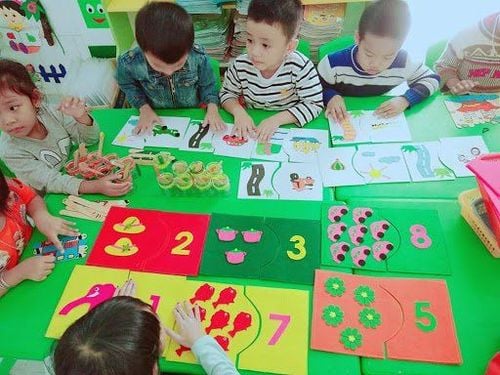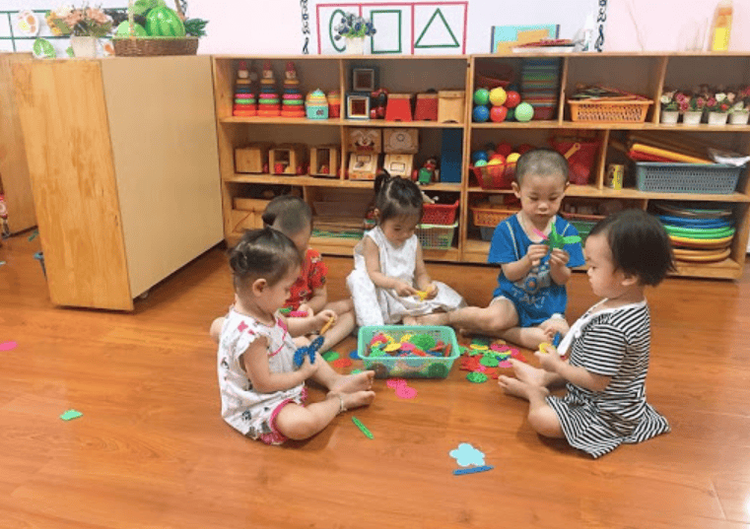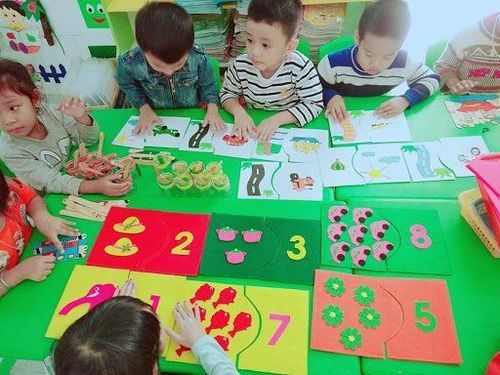This is an automatically translated article.
The article was consulted with Master, Doctor Doan Ngoc Quynh Tram - Pediatrician - Neonatologist - Department of Pediatrics - Neonatology - Vinmec Nha Trang International General Hospital.Preschoolers 33 months - 34 months are extremely active, interested in discovering everything. Your child's way of thinking gradually becomes more logical, memory and creativity increase. Preschool children begin to know how to help their parents with small things and take basic care of themselves.
1. Practice counting numbers
Children learning preschool at this stage will gradually form the ability to count, even though it is only at the beginning. At first, your child will distinguish between one and more than one, but the exact amount is not yet known. Children can count to 3, or imitate older siblings to count to 10, but actually still cannot understand the number being counted.At this stage, parents do not need to teach their children how to calculate, but just let them know the concept of numbers, teach them the number symbols on the page of the book. Counting steps, steps or wooden blocks when playing with puzzles are also a few good ways for 34-month-old preschoolers to become familiar with arithmetic.

2. Increased awareness of emotional states
As their third birthday approaches, preschool children become more and more concerned about those around them. You may notice your child is curious about other people's moods, wondering why the neighbor is angry or why dad is upset. Before your child's questions, try to explain, such as: The neighbor is angry because he can't take out the trash today. Through this, children will understand that happy and sad emotions are normal and we can share and confide in each other.There are times when a 33-month-old preschooler avoids when parents want to cuddle and kiss her. Maybe it's because your child is too active, doesn't like to sit still, unless he's tired. Or, for some children, getting out of their parents' arms is also a way to show independence. Parents shouldn't feel sad about being rejected, and don't force them either. Because when you need comfort, your baby will still run to you. In case your child refuses when you want to show your love, you can still run after him like playing chase and hugging him.
3. Respect your child's personality
A 34-month-old preschooler is increasingly showing traits that resemble their father or mother, possibly grandpa or grandma, or even a relative. While most children inherit many traits in common with their families, some are contrary to their parents. This will make it a little difficult for you to become close and raise your child.When your child's natural personality begins to show more, show that you will accept everything, whether your child is quiet, reckless, thinking or extroverted. It's still a good idea to encourage your child to explore other sides of himself, but don't force him to behave the way you want him to. Respecting your child's own reaction to things will give them a sense of reassurance and confidence.
For example, in families where parents are athletes, they often want their children to participate in a lot of physical activities. But if the child just likes to play gently and hang around in the house, parents should let the child develop naturally, not getting too involved in their child's interests.

4. Learn to make friends and share
As children get older, preschoolers are more and more interested in social interaction. Chances are your child is starting to see the kids he plays with as friends. Your baby also gradually learns that small acts of kindness like sharing and giving are part of friendship.Many children, especially those without siblings, will create imaginary friends to play with. Most of the time, this will appear between the ages of 2.5 and 3, and you don't need to worry because this is part of the natural conscience that your baby is developing. Imaginary friends can provide comfort and even take responsibility for things children want but can't do, such as going to parties, going to work like their parents, going out in the woods. .. Most of these friends gradually "disappear" before the child turns 6 years old.

5. Possible bad traits
Along with developing language abilities, a 33-month-old preschooler can develop a "bad temper". Babies may consider themselves the center of the universe and like to give orders with statements such as: Put your clothes on / I'm here / Dad, stand up... Sometimes, children like to give orders to attract attention. from you, because really want parents to listen or play with the baby right away. Although this natural mentality cannot be eliminated, parents can teach their children to speak more easily, politely add the word "yes / sir / ma" to each sentence, as well as use a gentle voice every time. when you want to ask for something. This is also the time when you need to let your child understand that wishes can not always be met immediately, help him learn patience and don't forget to give him feedback as soon as you can.Chances are you'll also hear from preschoolers saying things like: your head, idiot, dog, and many worse words. Don't get angry because it's not your baby's fault. A 33-month-old preschooler can hear and remember bad words that exist around him, such as in traffic, slang or "market" language from movies or from other babies. Your child will love repeating these sounds because they sound strange. The fastest way to deal with it is to gently remind and ignore it. If you show an attitude, your child will think these sentences are powerful and will use them more.
In addition to the way you talk, you can also have trouble with the clothes of a 34-month-old preschooler. If in the past she would wear whatever clothes you chose, now she has her own opinion about everything she wears. This is simply one of the ways babies show independence. Parents should not force their children to wear this and not that, unless the child needs to be seriously dressed for necessary occasions, or must be warm enough when it is cold.
Finally, do not forget to fully vaccinate and ensure that your child has a clean, healthy growing environment, limiting exposure to dust or disease sources. In addition, parents should also learn how to protect preschool children from common diseases according to the season and age, and take them to the doctor if there are abnormal signs.
Caring, protecting and nurturing children is a long process, so parents should be a companion to help children promote their listening, reading, speaking, communication, physical and mental abilities well. . For children to be healthy and develop well, it is necessary to have a nutritious diet in terms of quantity and quality balance. If children are not provided with adequate and balanced nutrients, it will lead to diseases of excess or lack of nutrients, which adversely affect the comprehensive development of children in terms of physical, mental and motor skills.
Parents should supplement their children with supportive products containing lysine, essential micro-minerals and vitamins such as zinc, chromium, selenium, and B vitamins to help fully meet their child's nutritional needs. At the same time, these essential vitamins also support digestion, enhance nutrient absorption, help improve anorexia, and help children eat well.
Parents can learn more:
Signs of zinc deficiency in children
Micronutrient deficiency and failure to gain weight in children
Please dial HOTLINE for more information or register for an appointment HERE. Download MyVinmec app to make appointments faster and to manage your bookings easily.
Reference source: babycenter.com













